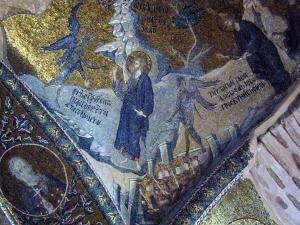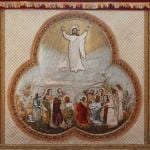
Christ, during his earthly ministry, found himself to be in the middle of a debate as to how the Jewish tradition, and therefore the practice of the Jewish faith, should and would continue in the future. Each of the various groups involved in the debate had some good associated with them. None of them were completely wrong. Jesus acknowledged this in the way he told his disciples to honor the “Seat of Moses” (cf. Matt. 23:2). Nonetheless, each of the various parties were imperfect, and so in each, there were reasons for Jesus to criticize them, resulting, of course, with the leaders of such groups becoming annoyed, if not outright hostile, towards him.
To many of the Jewish leaders of his day, the challenge Jesus presented was twofold: he did not place any one Jewish tradition and its ways above all others, and he was popular. His popularity meant that his deconstruction and reconstruction of Jewish interpretations of their covenant with God could not be ignored. His voice was one which could not be ignored; indeed, he spoke with authority.
Of all the major religious groups of his time, Jesus was closest to the Pharisees. Indeed, many of his disciples, many of his teachings, and indeed, the way he taught, could be seen connected with the early Rabbinic movement (connected mostly with the Pharisees). However, due to the way he engaged the powers that be, the way he transcended the Pharisees with this miracle working and promotion of the immanent kingdom of God, he attracted many Zealots to his cause. They hoped his talk about the messianic kingdom meant he would begin a militaristic uprising against Rome. The Zealots hoped that if they found the messiah, and worked with him in his quest for earthly power, they would come to hold positions of power and authority in the messianic kingdom. This explains why James and John, the Sons of Zebedee, wanted to “sit” right next to Christ; they were inspired by the Zealot ideal, hoping to be elevated and placed next to Christ in a purely earthly messianic kingdom.
Sadly, the lesson of James and John has not been properly understood by many, if not most, Christians today. They look to Christ along the lines of the Zealots, looking for Christ to take charge in the world. They seek after earthly power and want to possess that power for themselves. They think all they need to do is put it under the name of Christ, and others must follow after them and agree with them in their political pursuits. They do not just engage politics, they become possessed by politics, thinking political power is the way to enforce their understanding of the teachings of Christ. Nonetheless, if they listened to Jesus, they would know that such a politicization of his kingdom was not his intent. He did not come to engage earthly power and use it to force his will on others. He came as a servant, and his kingdom is manifested in and established in the way he liberates people from the tragedies of sin with his grace.
Thus, we can see the problem inherent with integralism: integralism follows after the errors of the Zealots. Those who embrace integralism think that if they establish some perfect theocracy on earth, they will manifest Christ’s through earthly power (power which they hope they will possess when that theocracy is established). Turning the message of Christ merely into a political platform translates the messianic kingdom into a purely earthly kingdom. They end up ignoring, if not outright rejecting, the transcendent element of the kingdom of God. As a result, instead of integrating the teachings of Christ, such as his teachings to help and elevate the poor and oppressed over the rich and powerful (which of course has political ramifications), zealotry confuses political power and authority, and the ways to hold on to such power, with the transcendent kingdom of God. Integralism, following its political ideology, creates a false representation of the kingdom which it then pits against Christ and the eschatological kingdom which is “not of this world” (not because it has no connection with the world, but because it does not establish itself from and support itself with the principles of earthly authority).
Sadly, so many Christians seek earthly power as the way to spread their understanding of the Christian faith, and when they gain such power, they become fanatics. They radicalize and absolutize their concerns and use it to justify their grasp for power. They take elements of the Gospel, elements of the Christian faith, to make it seem as if what they promote is Christian. But they neglect the true power of the Gospel. They follow after the Zealots who tried to use Christ as a pawn, claiming his name while ignoring all the teachings of the Christian faith. Thus, even though they claim to follow after Christ, and they try to show it by taking a few elements of what he said and emphasize it, ignoring the fullness of what he taught, they bow towards Satan, giving into his temptation for worldly power. What they represent is a pseudo-Christianity, an anti-Christianity which seeks to use Christ instead of to follow him. Those following this false Christianity will show themselves by the way they act against the dictates of love, all the while claiming religion and using it for their own private advantage. We are told to avoid associating such people with the faith:
For men will be lovers of self, lovers of money, proud, arrogant, abusive, disobedient to their parents, ungrateful, unholy, inhuman, implacable, slanderers, profligates, fierce, haters of good, treacherous, reckless, swollen with conceit, lovers of pleasure rather than lovers of God, holding the form of religion but denying the power of it. Avoid such people (2 Tim. 3:2-5 RSV).
True religion is not found with zealotry looking for power, but in loving one’s neighbor, working for the common good instead of seeking personal power and authority. “Religion that is pure and undefiled before God and the Father is this: to visit orphans and widows in their affliction, and to keep oneself unstained from the world” (Jas. 1:27 RSV). Those who are serving others will not seek power for themselves. Those who are serving others will be following Christ, truly bringing his presence with them, showing the power and value of the true kingdom of God. The eschatological kingdom reaches down onto the earth (through the incarnation) in order to lift up and help those in need instead of setting up and establishing an earthly kingdom. Thus, as Henri de Lubac said, “At each sincere stirring of charity, the Gospel triumphs, Christianity is already effective.”[1] It is in those following Christ, in those living a life of charity, and not those seeking worldly power, in which the kingdom of God is found.
Integralism might try to claim Christ, but they seek after an order which undermines and limits the true kingdom of God. Instead of raising the world up through the transcendence of the messianic kingdom, they will try to lower the kingdom of God to the ways of fallen creation, absolutizing principles which detour us from God’s kingdom. Integralism is one of the many ideological successors to the Zealots. When confronted by it, we should not give into the temptation which is inspires; instead, we should truly heed Christ and remember that his kingdom transcends all such earthly ambition, and so the glory which it will provide will be far greater than what can be found in earthly glory. It has been revealed on the cross, not in the sword, and so, if we want a part of it, we must put on the mantle of the cross and take away the sword and all that the sword suggests.
[1] Henri de Lubac, Paradoxes of Faith. Trans. Paul Simon, Sadie Kreilkamp and Ernest Beaumont (San Francisco: Ignatius Press, 1987), 152.
Stay in touch! Like A Little Bit of Nothing on Facebook.
If you liked what you read, please consider sharing it with your friends and family!
















